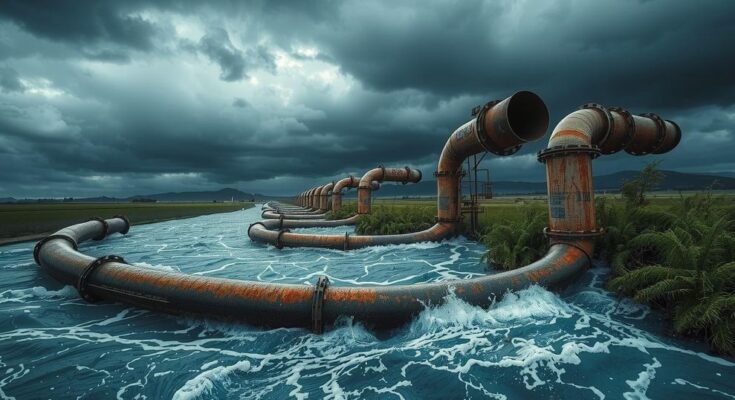Nigeria’s efforts to revitalize oil production face new challenges due to sabotage of the Trans-Niger Pipeline, which affects exports. President Tinubu’s state of emergency reflects underlying political instability contributing to the threats against infrastructure. A recent court ruling and subsequent suspensions add to the complexity, raising concerns regarding investment and operational stability in the oil sector.
Nigeria’s ambitions to boost oil production and attract investment are jeopardized by recent sabotage incidents affecting its crude pipeline systems. The country’s oil output has recovered by 40% in recent years, yet vandalism on the Trans-Niger Pipeline, which accounts for approximately 15% of the nation’s exports, poses a significant challenge. Despite efforts to enhance security, President Bola Tinubu has declared a state of emergency in Rivers State, attributing ongoing sabotage to political stagnation among local officials.
Clementine Wallop, director for sub-Saharan Africa at Horizon Engage, indicated that this incident represents a setback for the Tinubu administration’s recent advancements in oil production, particularly given its positive trajectory in recent security improvements. Additionally, the situation creates a daunting investment climate at a time when the government seemed to be overcoming previous energy sector issues.
Despite the sabotage, Renaissance Africa Energy, which recently acquired the Trans-Niger Pipeline assets from Shell Plc, stated that it will not declare force majeure concerning Bonny Light crude exports. Currently, two tankers are poised to load at the Bonny terminal, as confirmed by ship tracking data from Bloomberg.
In 2022, Nigeria’s oil production suffered significantly, where illegal tapping affected the Trans-Niger Pipeline in over 150 locations, drastically impacting production volumes. The tightening of security measures on the oil pipelines has resulted in thieves shifting their focus to gas conduits, showcasing the pervasiveness of vandalism, which is critical for Nigeria’s economy, reliant on oil and gas revenues for nearly half of its budget.
The political turmoil surrounding the state of emergency exacerbates the situation, initiated by a fallout between Governor Siminalayi Fubara and his predecessor, Nyesom Wike, resulting in localized factions potentially escalating into violence. Wallop noted an increased likelihood of unrest under these conditions.
Adding to the complexity, Nigeria’s highest court recently determined that Governor Fubara acted unlawfully when governing without a majority of legislators loyal to his opposition rival, which has compounded tensions. In response, President Tinubu suspended Fubara and his deputy for six months, opting to appoint a retired military administrator for state governance.
Renaissance has initiated an investigation into the sabotage incidents. While choosing not to declare force majeure, the damage inflicted represents a considerable initial challenge for the local consortium. Mansur Mohammed, from Wood Mackenzie Ltd., highlighted how Renaissance’s responses will influence the management of issues in Nigeria’s oil and gas sector by domestic operators.
The recent sabotage of Nigeria’s Trans-Niger Pipeline has raised significant concerns regarding the country’s efforts to revive oil production and ensure investment stability. Increased political instability, highlighted by the declaration of a state of emergency, alongside vandalism issues, threatens the reliability of Nigeria’s oil infrastructure. It remains to be seen how local operators, particularly Renaissance Africa Energy, will manage these challenges moving forward, as the interplay of security and political dynamics continues to evolve in this critical sector.
Original Source: www.rigzone.com




